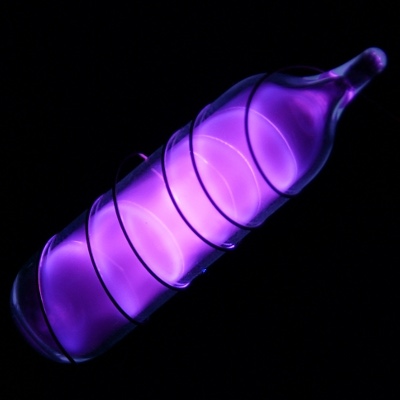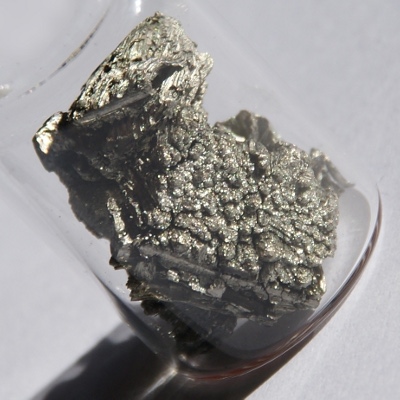Periodic Table Element Comparison: Compare Elements - Argon vs Scandium
Compare Argon and Scandium on the basis of their properties, attributes and periodic table facts. Compare elements on more than 90 properties. All the elements of similar categories show a lot of similarities and differences in their chemical, atomic, physical properties and uses. These similarities and dissimilarities should be known while we study periodic table elements. You can study the detailed comparison between Argon vs Scandium with most reliable information about their properties, attributes, facts, uses etc. You can compare Ar vs Sc on more than 90 properties like electronegativity , oxidation state, atomic shells, orbital structure, Electronaffinity, physical states, electrical conductivity and many more. Argon and Scandium comparison table on more than 90 properties.
Argon and Scandium Comparison
Facts
| Name | Argon | Scandium |
|---|---|---|
| Atomic Number | 18 | 21 |
| Atomic Symbol | Ar | Sc |
| Atomic Weight | 39.948 | 44.95591 |
| Phase at STP | Gas | Solid |
| Color | Colorless | Silver |
| Metallic Classification | Noble Gas | Transition Metal |
| Group in Periodic Table | group 18 | group 3 |
| Group Name | helium family or neon family | scandium family |
| Period in Periodic Table | period 3 | period 4 |
| Block in Periodic Table | p -block | d -block |
| Electronic Configuration | [Ne] 3s2 3p6 | [Ar] 3d1 4s2 |
| Electronic Shell Structure (Electrons per shell) | 2, 8, 8 | 2, 8, 9, 2 |
| Melting Point | 83.8 K | 1814 K |
| Boiling Point | 87.3 K | 3103 K |
| CAS Number | CAS7440-37-1 | CAS7440-20-2 |
| Neighborhood Elements | Neighborhood Elements of Argon | Neighborhood Elements of Scandium |
History
| Parameter | Argon | Scandium |
|---|---|---|
| History | The element Argon was discovered by Lord Rayleigh and W. Ramsay in year 1894 in United Kingdom. Argon derived its name from the Greek word argos, meaning 'idle'. | The element Scandium was discovered by F. Nilson in year 1879 in Sweden. Scandium derived its name from Scandia, the Latin name for Scandinavia. |
| Discovery | Lord Rayleigh and W. Ramsay (1894) | F. Nilson (1879) |
| Isolated | Lord Rayleigh and W. Ramsay (1894) | F. Nilson (1879) |
Presence: Abundance in Nature and Around Us
Parts per billion (ppb) by weight / by atoms (1ppb =10^-7 %)
| Property | Argon | Scandium |
|---|---|---|
| Abundance in Universe | 200000 / 6000 | 30 / 1 |
| Abundance in Sun | 70000 / 2000 | 40 / 1 |
| Abundance in Meteorites | - / - | 6500 / 2900 |
| Abundance in Earth's Crust | 1500 / 780 | 26000 / 12000 |
| Abundance in Oceans | 450 / 70 | 0.0015 / 0.00021 |
| Abundance in Humans | - / - | - / - |
Crystal Structure and Atomic Structure
| Property | Argon | Scandium |
|---|---|---|
| Atomic Volume | 22.4134 cm3/mol | 15.061 cm3/mol |
| Atomic Radius | 71 pm | 184 pm |
| Covalent Radius | 97 pm | 144 pm |
| Van der Waals Radius | 188 pm | 211 pm |
Atomic Spectrum - Spectral Lines | ||
| Emission Spectrum |  |  |
| Absorption Spectrum |  |  |
| Lattice Constant | 525.6, 525.6, 525.6 pm | 330.9, 330.9, 527.33 pm |
| Lattice Angle | π/2, π/2, π/2 | π/2, π/2, 2 π/3 |
| Space Group Name | Fm_ 3m | P63/mmc |
| Space Group Number | 225 | 194 |
| Crystal Structure | Face Centered Cubic  | Simple Hexagonal 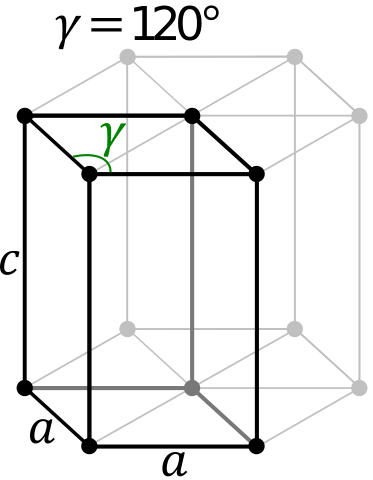 |
Atomic and Orbital Properties
| Property | Argon | Scandium |
|---|---|---|
| Atomic Number | 18 | 21 |
| Number of Electrons (with no charge) | 18 | 21 |
| Number of Protons | 18 | 21 |
| Mass Number | 39.948 | 44.95591 |
| Number of Neutrons | 22 | 24 |
| Shell structure (Electrons per energy level) | 2, 8, 8 | 2, 8, 9, 2 |
| Electron Configuration | [Ne] 3s2 3p6 | [Ar] 3d1 4s2 |
| Valence Electrons | 3s2 3p6 | 3d1 4s2 |
| Oxidation State | 0 | 3 |
| Atomic Term Symbol (Quantum Numbers) | 1S0 | 2D3/2 |
| Shell structure | 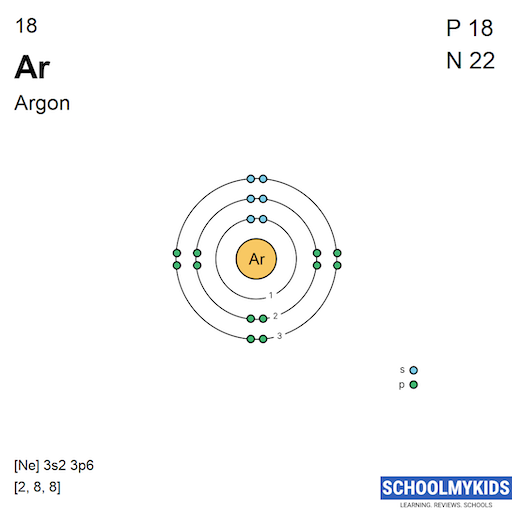 | 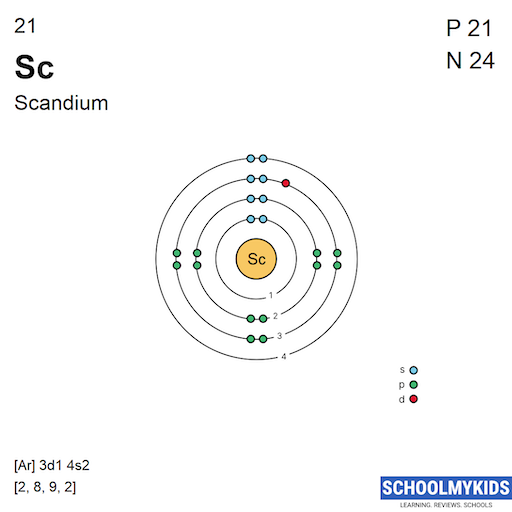 |
Isotopes and Nuclear Properties
Argon has 3 stable naturally occuring isotopes while Scandium has 1 stable naturally occuring isotopes.
| Parameter | Argon | Scandium |
|---|---|---|
| Known Isotopes | 30Ar, 31Ar, 32Ar, 33Ar, 34Ar, 35Ar, 36Ar, 37Ar, 38Ar, 39Ar, 40Ar, 41Ar, 42Ar, 43Ar, 44Ar, 45Ar, 46Ar, 47Ar, 48Ar, 49Ar, 50Ar, 51Ar, 52Ar, 53Ar | 36Sc, 37Sc, 38Sc, 39Sc, 40Sc, 41Sc, 42Sc, 43Sc, 44Sc, 45Sc, 46Sc, 47Sc, 48Sc, 49Sc, 50Sc, 51Sc, 52Sc, 53Sc, 54Sc, 55Sc, 56Sc, 57Sc, 58Sc, 59Sc, 60Sc |
| Stable Isotopes | Naturally occurring stable isotopes: 36Ar, 38Ar, 40Ar | Naturally occurring stable isotopes: 45Sc |
| Neutron Cross Section | 0.65 | 27.2 |
| Neutron Mass Absorption | 0.0006 | 0.025 |
Chemical Properties: Ionization Energies and electron affinity
| Property | Argon | Scandium |
|---|---|---|
| Valence or Valency | 0 | 3 |
| Electronegativity | - | 1.36 Pauling Scale |
| Electron Affinity | 0 kJ/mol | 18.1 kJ/mol |
| Ionization Energies | 1st: 1520.6 kJ/mol 2nd: 2665.8 kJ/mol 3rd: 3931 kJ/mol 4th: 5771 kJ/mol 5th: 7238 kJ/mol 6th: 8781 kJ/mol 7th: 11995 kJ/mol 8th: 13842 kJ/mol 9th: 40760 kJ/mol 10th: 46186 kJ/mol 11th: 52002 kJ/mol 12th: 59653 kJ/mol 13th: 66199 kJ/mol 14th: 72918 kJ/mol 15th: 82473 kJ/mol 16th: 88576 kJ/mol 17th: 397605 kJ/mol 18th: 427066 kJ/mol | 1st: 633.1 kJ/mol 2nd: 1235 kJ/mol 3rd: 2388.6 kJ/mol 4th: 7090.6 kJ/mol 5th: 8843 kJ/mol 6th: 10679 kJ/mol 7th: 13310 kJ/mol 8th: 15250 kJ/mol 9th: 17370 kJ/mol 10th: 21726 kJ/mol 11th: 24102 kJ/mol 12th: 66320 kJ/mol 13th: 73010 kJ/mol 14th: 80160 kJ/mol 15th: 89490 kJ/mol 16th: 97400 kJ/mol 17th: 105600 kJ/mol 18th: 117000 kJ/mol 19th: 124270 kJ/mol 20th: 547530 kJ/mol 21st: 582163 kJ/mol |
Physical Properties
| Property | Argon | Scandium |
|---|---|---|
| Density | 0.001784 g/cm3 | 2.985 g/cm3 |
| Molar Volume | 22.4134 cm3/mol | 15.061 cm3/mol |
Elastic Properties | ||
| Young Modulus | - | 74 |
| Shear Modulus | - | 29 GPa |
| Bulk Modulus | - | 57 GPa |
| Poisson Ratio | - | 0.28 |
Hardness - Tests to Measure of Hardness of Element | ||
| Mohs Hardness | - | - |
| Vickers Hardness | - | - |
| Brinell Hardness | - | 750 MPa |
Electrical Properties | ||
| Electrical Conductivity | - | 1800000 S/m |
| Resistivity | - | 5.5e-7 m Ω |
| Superconducting Point | - | 0.05 |
Heat and Conduction Properties | ||
| Thermal Conductivity | 0.01772 W/(m K) | 16 W/(m K) |
| Thermal Expansion | - | 0.0000102 /K |
Magnetic Properties | ||
| Magnetic Type | Diamagnetic | Paramagnetic |
| Curie Point | - | - |
| Mass Magnetic Susceptibility | -6e-9 m3/kg | 8.8e-8 m3/kg |
| Molar Magnetic Susceptibility | -2.4e-10 m3/mol | 3.956e-9 m3/mol |
| Volume Magnetic Susceptibility | -1.07e-8 | 0.0002627 |
Optical Properties | ||
| Refractive Index | 1.000281 | - |
Acoustic Properties | ||
| Speed of Sound | 319 m/s | - |
Thermal Properties - Enthalpies and thermodynamics
| Property | Argon | Scandium |
|---|---|---|
| Melting Point | 83.8 K | 1814 K |
| Boiling Point | 87.3 K | 3103 K |
| Critical Temperature | 150.87 K | - |
| Superconducting Point | - | 0.05 |
Enthalpies | ||
| Heat of Fusion | 1.18 kJ/mol | 16 kJ/mol |
| Heat of Vaporization | 6.5 kJ/mol | 318 kJ/mol |
| Heat of Combustion | - | - |
Regulatory and Health - Health and Safety Parameters and Guidelines
| Parameter | Argon | Scandium |
|---|---|---|
| CAS Number | CAS7440-37-1 | CAS7440-20-2 |
| RTECS Number | RTECSCF2300000 | - |
| DOT Hazard Class | 2.2 | 4.1 |
| DOT Numbers | 1951 | 3089 |
| EU Number | - | - |
| NFPA Fire Rating | - | - |
| NFPA Health Rating | - | - |
| NFPA Reactivity Rating | - | - |
| NFPA Hazards | - | - |
| AutoIgnition Point | - | - |
| Flashpoint | - | - |
Compare With Other Elements
Compare Argon and Scandium with other elements of the periodic table.
